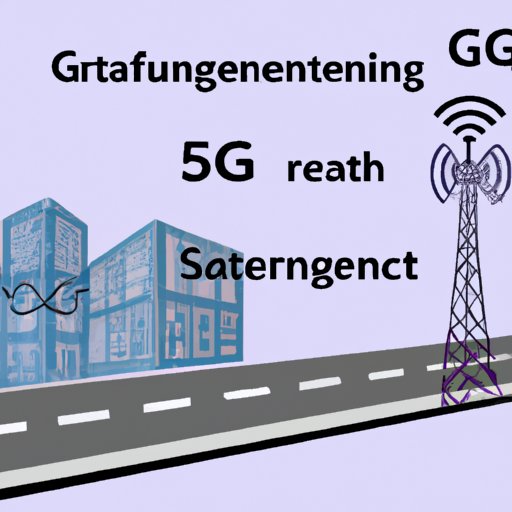Introduction
5G technology is the fifth generation of wireless technology and it promises a revolution in speed, performance, and connectivity. It is expected to be faster than 4G LTE, have higher capacity, and offer better coverage. But is 5G really worth it? This article will provide an overview of the cost/benefit analysis of 5G technology and explore how it could change the way we live and work.
Pros and Cons of 5G
Before deciding whether or not 5G is worth the investment, it is important to consider both the pros and cons of this technology.
Benefits of 5G
The main benefit of 5G is increased speed. With 5G, data can be transferred up to 100 times faster than 4G LTE. This means that users will be able to download large files almost instantly. Additionally, 5G networks are more reliable and offer better coverage than 4G networks. This means that users will be able to access the internet in places where they were unable to before.
Drawbacks of 5G
One of the main drawbacks of 5G is the cost. 5G technology requires new infrastructure and hardware, which can be expensive to install and maintain. Additionally, 5G networks consume more power than 4G networks, so there are environmental concerns as well. Finally, 5G networks are still relatively new, so there may be some teething issues with the technology.
Is It Worth the Investment?
Ultimately, the decision as to whether or not 5G is worth the investment comes down to individual needs and preferences. For those who need faster speeds and improved coverage, 5G may be worth the investment. However, for those who don’t require such high speeds or improved coverage, 4G may be sufficient.

How 5G Could Change the Way We Live and Work
If 5G is adopted, it could have a huge impact on the way we live and work. Here are some of the ways in which 5G could revolutionize our lives:
Increased Connectivity
One of the key benefits of 5G is increased connectivity. 5G networks are able to connect multiple devices at once, which means that users will be able to access the internet from more places. This could open up new possibilities for remote working, telemedicine, and other applications.
Improved Performance
As mentioned earlier, 5G networks are much faster than 4G networks. This means that users will be able to access the internet at much higher speeds, which will make streaming and downloading content much easier. Additionally, 5G networks are more reliable, which means that users will experience fewer dropped connections.
New Possibilities for Businesses
Businesses will also benefit from 5G technology. The increased speeds and reliability of 5G networks could enable businesses to develop new products and services, as well as improve existing ones. Additionally, 5G networks could enable businesses to streamline their operations and reduce costs.

An Overview of 5G: What You Need to Know
Now that you have a better understanding of the potential benefits of 5G, let’s take a look at the different types of 5G and the requirements for using this technology.
The Different Types of 5G
There are three types of 5G technology: low-band, mid-band, and high-band. Low-band 5G is the slowest type of 5G but offers the best coverage. Mid-band 5G provides faster speeds than low-band 5G but has a shorter range. High-band 5G is the fastest type of 5G but has the shortest range.
Requirements for 5G
In order to use 5G technology, you will need a compatible device and a 5G network. Most phones released after 2018 are compatible with 5G, while older devices may require a software update. Additionally, you will need to be in an area with a 5G network, which may be limited depending on your location.
The Future of 5G: What’s Next for This Technology?
Despite the drawbacks of 5G, there is no denying that this technology has the potential to revolutionize the way we live and work. Here are some of the ways in which 5G could shape the future:
Improved Network Efficiency
5G networks are expected to be more efficient than 4G networks, which means that users will be able to do more with less. This could lead to improved battery life for devices, as well as reduced data usage. Additionally, 5G networks are expected to be more secure than 4G networks, which could help protect users from cyber threats.
Potential Applications
5G technology could open up a world of possibilities for businesses and consumers alike. For example, 5G could enable autonomous vehicles, real-time augmented reality applications, and smart cities. Additionally, 5G could enable businesses to develop new products and services, as well as improve existing ones.
Preparing for the Future
5G technology is still in its infancy, but it is expected to become more widely available over the next few years. In order to prepare for the future, it is important to understand the different types of 5G and the requirements for using this technology. Additionally, it is important to keep up to date with the latest developments in 5G in order to stay ahead of the curve.
Conclusion
5G technology has the potential to revolutionize the way we live and work. While there are drawbacks to this technology, such as cost and environmental concerns, the potential benefits could outweigh these drawbacks. Ultimately, the decision as to whether or not 5G is worth the investment comes down to individual needs and preferences. However, it is clear that 5G has the potential to change the way we live and work in the future.


